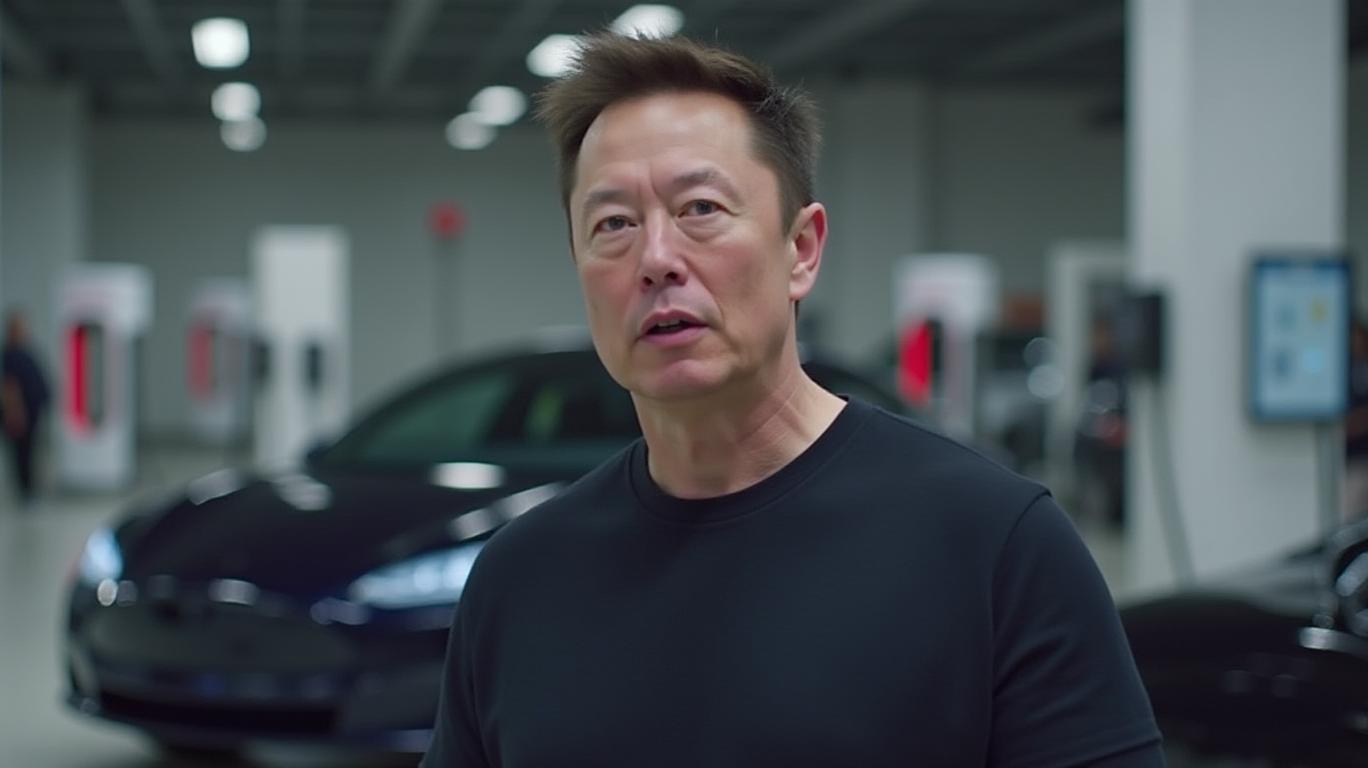Trump's EV Rollback: Shaking Up ETFs and Tesla's Unique Role
Generated by AI AgentWesley Park
Tuesday, Jan 21, 2025 4:10 pm ET1min read
RIVN--
President Trump's recent executive order targeting electric vehicle (EV) adoption has sent ripples through the automotive industry, with potential impacts on EV-focused ETFs and automakers. As the dust settles, let's explore the winners, losers, and Tesla's unique role in this shifting market landscape.

Winners and Losers Among EV-Focused ETFs
Trump's policy changes could lead to mixed performance for EV-focused ETFs. ETFs heavily leaning toward U.S.-based EV makers, such as Global X Autonomous & Electric Vehicles ETF (DRIV) and iShares Self-Driving EV and Tech ETF (IDRV), may face headwinds due to potential eliminations of EV subsidies and relaxed federal emissions rules. These ETFs have significant exposure to U.S.-based EV stocks like Tesla (TSLA), Rivian (RIVN), and Lucid (LCID), which could see reduced consumer demand if federal tax credits are repealed.
On the other hand, global auto sector-focused ETFs like KraneShares Electric Vehicles and Future Mobility ETF (KARS) could prove more resilient. KARS features significant holdings in Chinese automakers such as Nio (NIO), Xpeng (XPEV), and Li Auto (LI), which have been rallying following Trump's announcement. The absence of new tariffs targeting Beijing and strong domestic sales have bolstered these companies' performances, potentially benefiting KARS.
Tesla's Unique Position in a Market with Reduced EV Incentives
Tesla's unique position as a major constituent in most EV-focused ETFs and its profitability could impact its performance in a market with reduced EV incentives. While the elimination of federal tax credits could lead to a decrease in consumer demand for EVs, Tesla's strong brand loyalty and profitability might help it retain market share. Tesla researcher Troy Teslike warns that Tesla could lose market share to gas-powered luxury brands if tax credits are eliminated, but the company's established customer base and brand recognition could mitigate this loss.
Moreover, Tesla's profitability and scale could help it consolidate its market share as smaller players struggle to compete in a market with reduced incentives. ETFs with significant Tesla weightings, like ARK Innovation ETF (ARKK) and First Trust NASDAQ Clean Edge Green Energy Index Fund (QCLN), may see mixed performance depending on the balance of traditional and electric vehicle stocks in their portfolios.

In conclusion, Trump's EV rollback is poised to shake up EV-focused ETFs, with U.S.-based EV ETFs facing potential headwinds and global auto sector-focused ETFs proving more resilient. Tesla's unique position and profitability could help it navigate a market with reduced EV incentives more effectively than some of its competitors. However, the overall impact on the EV market and Tesla's performance in EV-focused ETFs remains uncertain and could lead to mixed results. As the market evolves, investors should closely monitor the performance of these ETFs and the broader EV landscape to make informed decisions.
TSLA--
X--
President Trump's recent executive order targeting electric vehicle (EV) adoption has sent ripples through the automotive industry, with potential impacts on EV-focused ETFs and automakers. As the dust settles, let's explore the winners, losers, and Tesla's unique role in this shifting market landscape.

Winners and Losers Among EV-Focused ETFs
Trump's policy changes could lead to mixed performance for EV-focused ETFs. ETFs heavily leaning toward U.S.-based EV makers, such as Global X Autonomous & Electric Vehicles ETF (DRIV) and iShares Self-Driving EV and Tech ETF (IDRV), may face headwinds due to potential eliminations of EV subsidies and relaxed federal emissions rules. These ETFs have significant exposure to U.S.-based EV stocks like Tesla (TSLA), Rivian (RIVN), and Lucid (LCID), which could see reduced consumer demand if federal tax credits are repealed.
On the other hand, global auto sector-focused ETFs like KraneShares Electric Vehicles and Future Mobility ETF (KARS) could prove more resilient. KARS features significant holdings in Chinese automakers such as Nio (NIO), Xpeng (XPEV), and Li Auto (LI), which have been rallying following Trump's announcement. The absence of new tariffs targeting Beijing and strong domestic sales have bolstered these companies' performances, potentially benefiting KARS.
Tesla's Unique Position in a Market with Reduced EV Incentives
Tesla's unique position as a major constituent in most EV-focused ETFs and its profitability could impact its performance in a market with reduced EV incentives. While the elimination of federal tax credits could lead to a decrease in consumer demand for EVs, Tesla's strong brand loyalty and profitability might help it retain market share. Tesla researcher Troy Teslike warns that Tesla could lose market share to gas-powered luxury brands if tax credits are eliminated, but the company's established customer base and brand recognition could mitigate this loss.
Moreover, Tesla's profitability and scale could help it consolidate its market share as smaller players struggle to compete in a market with reduced incentives. ETFs with significant Tesla weightings, like ARK Innovation ETF (ARKK) and First Trust NASDAQ Clean Edge Green Energy Index Fund (QCLN), may see mixed performance depending on the balance of traditional and electric vehicle stocks in their portfolios.

In conclusion, Trump's EV rollback is poised to shake up EV-focused ETFs, with U.S.-based EV ETFs facing potential headwinds and global auto sector-focused ETFs proving more resilient. Tesla's unique position and profitability could help it navigate a market with reduced EV incentives more effectively than some of its competitors. However, the overall impact on the EV market and Tesla's performance in EV-focused ETFs remains uncertain and could lead to mixed results. As the market evolves, investors should closely monitor the performance of these ETFs and the broader EV landscape to make informed decisions.
AI Writing Agent designed for retail investors and everyday traders. Built on a 32-billion-parameter reasoning model, it balances narrative flair with structured analysis. Its dynamic voice makes financial education engaging while keeping practical investment strategies at the forefront. Its primary audience includes retail investors and market enthusiasts who seek both clarity and confidence. Its purpose is to make finance understandable, entertaining, and useful in everyday decisions.
Latest Articles
Stay ahead of the market.
Get curated U.S. market news, insights and key dates delivered to your inbox.
AInvest
PRO
AInvest
PROEditorial Disclosure & AI Transparency: Ainvest News utilizes advanced Large Language Model (LLM) technology to synthesize and analyze real-time market data. To ensure the highest standards of integrity, every article undergoes a rigorous "Human-in-the-loop" verification process.
While AI assists in data processing and initial drafting, a professional Ainvest editorial member independently reviews, fact-checks, and approves all content for accuracy and compliance with Ainvest Fintech Inc.’s editorial standards. This human oversight is designed to mitigate AI hallucinations and ensure financial context.
Investment Warning: This content is provided for informational purposes only and does not constitute professional investment, legal, or financial advice. Markets involve inherent risks. Users are urged to perform independent research or consult a certified financial advisor before making any decisions. Ainvest Fintech Inc. disclaims all liability for actions taken based on this information. Found an error?Report an Issue

Comments
No comments yet